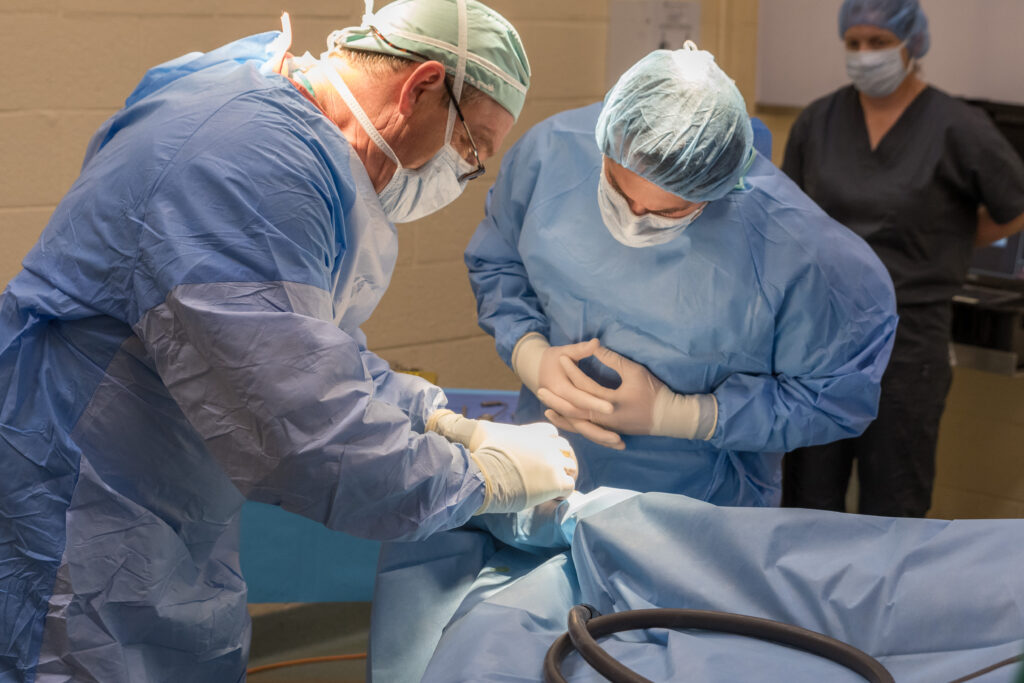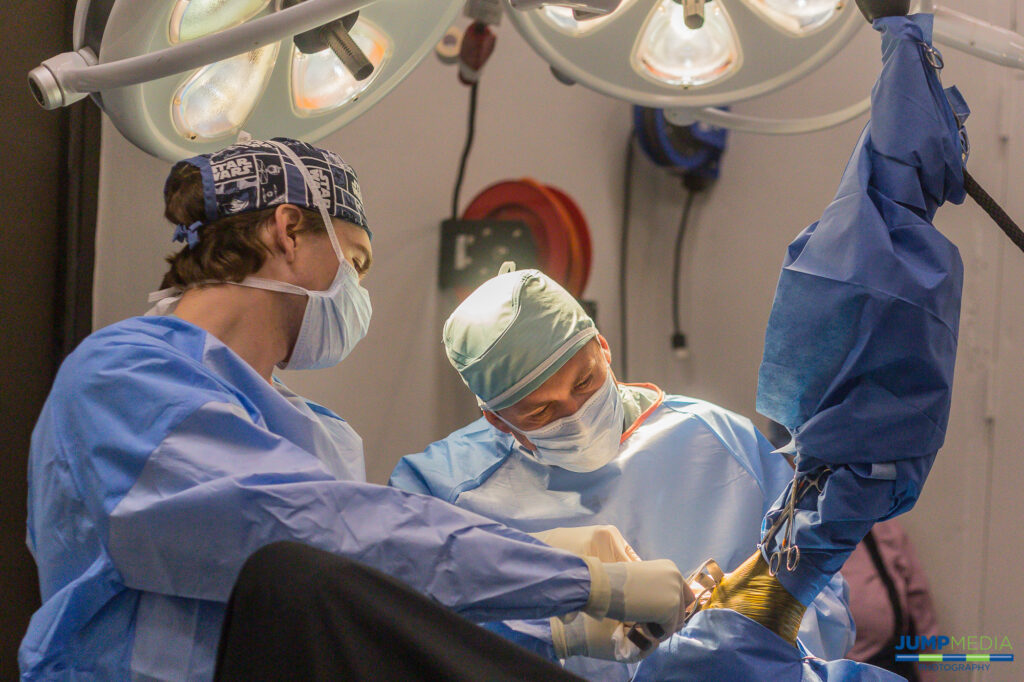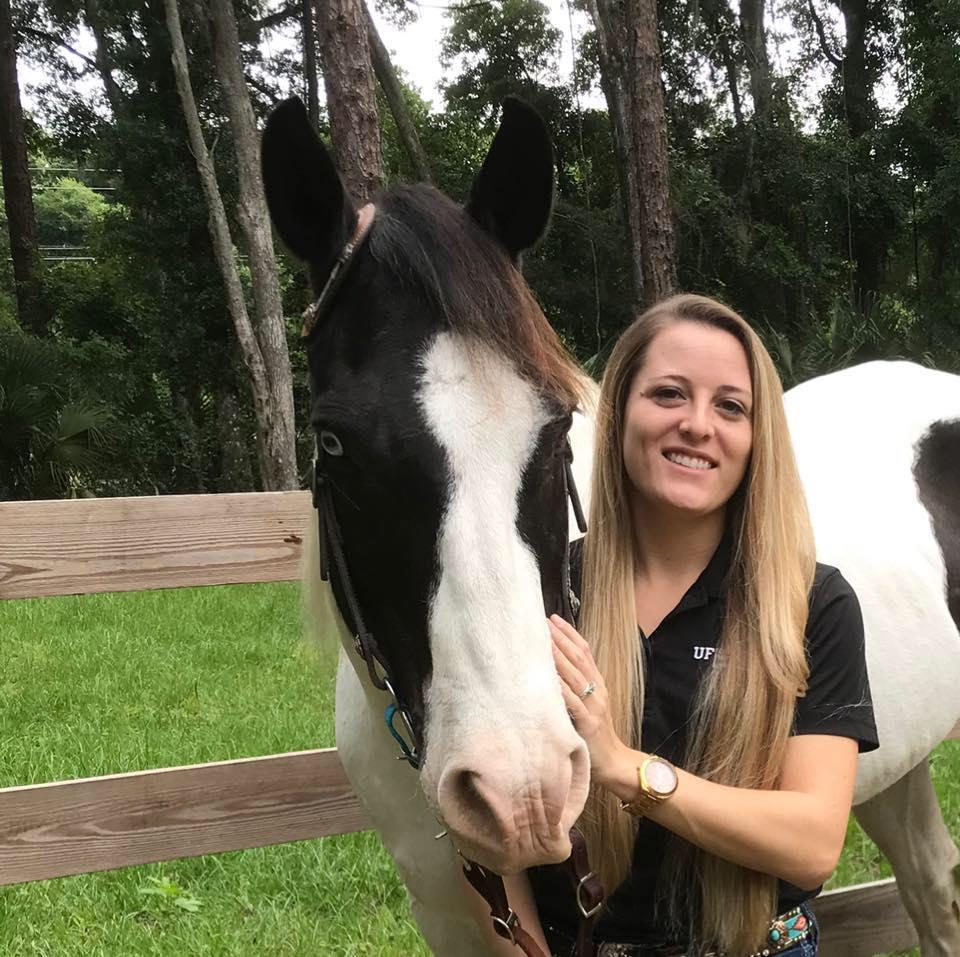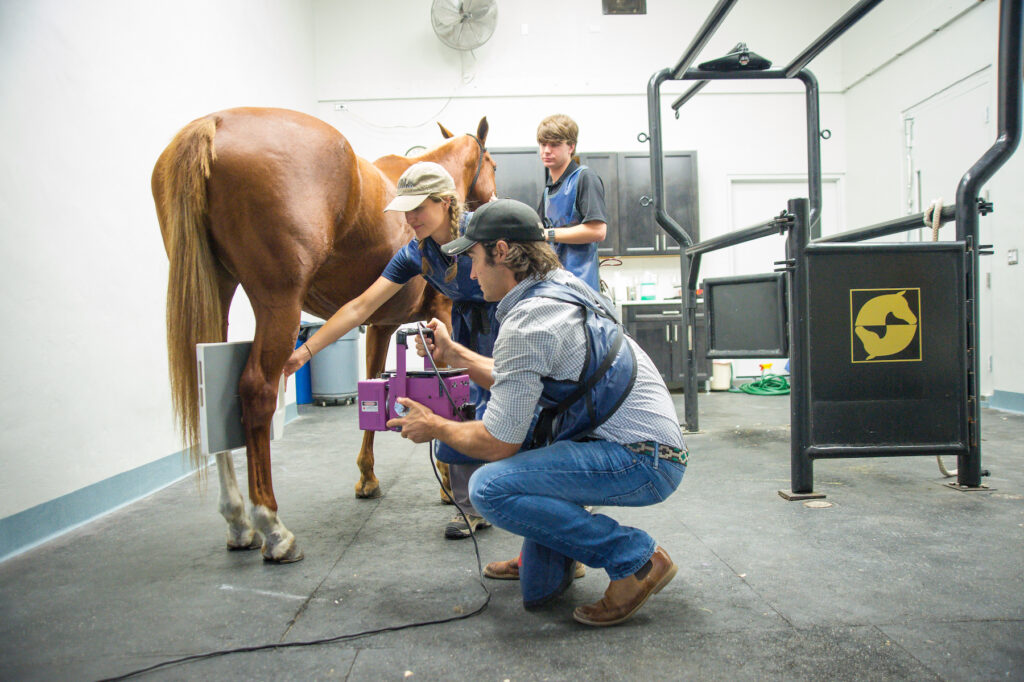Tag: interns
Palm Beach Equine Clinic Provides Veterinary Students Opportunities to Further Education and Career

The path of veterinary medicine involves many years of devotion to education, both at the undergraduate and graduate level, prior to putting that knowledge into practice. Only a handful of those students choose to pursue equine medicine, and an even smaller subset then take on the challenge of becoming a board-certified specialist in their chosen field.
Since its inception 40 years ago, Palm Beach Equine Clinic (PBEC) has been committed to supporting the next generation of equine veterinarians and has provided numerous students, at various stages in their education, with learning opportunities and mentorship. Through externship, internship, and residency programs, PBEC has helped prepare students and veterinary graduates to lay the groundwork for successful future careers.
Equine Medicine in the Equestrian Capital
One of the key benefits of the programs is that PBEC is based in Wellington, Florida, an area that has rightfully earned its title of “Winter Equestrian Capital of the World.” The region is home to show jumping, dressage, polo, racing, and western performance horses; allowing ample opportunities for veterinarians to become well-rounded sports medicine practitioners.
“We are one of the foremost equine medical centers in North America and based in the epicenter of the equine industry,” said Dr. Scott Swerdlin, the president of PBEC who also spearheads the clinic’s Internship Committee. “The opportunities we are able to offer students looking to pursue a career in sports medicine are unmatched. In this regard, we are fortunate to attract top talent from some of the most prestigious universities around the world. Our interns get to be part of all the action and learn in an environment where every aspect of the horse’s health is examined with a fine-tooth comb.”

A Melting Pot of Expertise
PBEC’s team encompasses over 35 veterinarians who hail from across the U.S. and abroad to Canada, Colombia, Argentina, Australia, the U.K., and beyond. Their areas of expertise are wide-ranging, from lameness to acupuncture and breeding to dentistry, including board-certified specialists in surgery, diagnostic imaging, and internal medicine.
Dr. Sidney Chanutin grew up immersed in the horse world and spent time shadowing nearly every veterinarian at PBEC while she was in high school. After earning her doctorate in veterinary medicine from the University of Florida, she returned to officially join the PBEC team as an intern.

“What I most enjoyed about my internship was learning from a diverse group of veterinarians,” said Dr. Chanutin, “along with their different backgrounds, styles of working, and varied approaches to problem-solving. Everyone is willing to help and offer their unique perspective, so it’s a truly cohesive team.”
The first introduction to PBEC for many students is an externship. Qualified veterinary students in their final years of school can spend a few weeks with the PBEC team shadowing emergency cases in the hospital, on ambulatory calls, and at sports medicine appointments at the industry’s top competition venues. Externships also act as an introduction to the practice for many students seeking an internship upon graduation. This allows both the aspiring veterinarian and the PBEC team to become familiar with each other and see if it may potentially be a good match for a 12-month internship position.
Dr. Santiago Demierre is originally from Argentina and completed his degree in veterinary medicine from the Universidad de Buenos Aires in 2012. He validated his veterinary degree in the United States in 2017 through a certification program with the American Veterinary Medical Association. Dr. Demierre was an integral part of PBEC initially as an intern before becoming an official staff veterinarian.
“The high caseload and long-term partnerships working and learning alongside great veterinarians helped me not only in improving my professional skills and knowledge but also with other aspects such as communication with clients and colleagues,” Dr. Demierre reflected.

Unlike in human medicine, internships are optional for veterinarians. Once a veterinarian passes the necessary state board exams, they can start treating animals on day one out of school. Choosing to work under the supervision and mentorship of experienced veterinarians allows interns to apply their years of learning in the classroom into clinical practice. At PBEC, interns can learn with the aid of advanced technologies in diagnostic imaging, innovative regenerative therapies, reproduction and fertility software, and specialized surgical suites.
“While we can teach and provide them with a wealth of knowledge and hands-on experience,” Dr. Swerdlin explained, “our interns in return are extremely valuable to us because they bring a fresh mindset and new ideas to the team,” explained Dr. Swerdlin. “The ability to work well with others, a good sense of humor, great work ethic, and most importantly, excellent communication skills are the qualities I look for in an intern.”
Never Stop Learning
Continuing education is a major component of a life in medicine. In addition to journal clubs, educational seminars, and opportunities to travel to professional conferences, students are always exposed to learning opportunities by working collaboratively with colleagues as well as visiting and referring veterinarians.
After completing their internship, most will pursue an associate veterinarian position, whether at PBEC, another private practice, a university, or work independently. Some will go a step further and advance their education through a residency program. Residencies are rigorous two to four year commitments—length dependent on the specialty—designed to give veterinarians the skillset, knowledge base, and experience required to become eligible for certification by veterinary medical specialty boards. Board-certified specialists are considered experts in their field and often treat complicated, difficult cases.
With board-certified specialists on staff, PBEC has provided residencies to select veterinarians over the years, including Dr. Michael Myhre. A graduate of Cornell University College of Veterinary Medicine, Dr. Myhre fulfilled his surgical residency under the direction of PBEC’s board-certified surgeons Dr. Robert Brusie, Dr. Weston Davis, and Dr. Jorge Gomez. He assisted on over 568 surgeries over his three years at PBEC.
“Completing my residency at PBEC has allowed me to pursue my dream of becoming an equine surgeon and working at a large referral center in the northeast. I learned a great deal about all aspects of general surgery, but especially orthopedic surgery. We did many fracture repairs at PBEC, and I would love to continue focusing on these in the future. Without my time at PBEC, I wouldn’t be able to practice as I am now,” Dr. Myhre said.

Externs, interns, and residents are integral members of the equine hospital. It is part of PBEC’s mission to support the community, which includes the next generation of equine veterinarians.
Dr. Swerdlin said, “Teaching and mentoring young veterinarians and watching them grow into confident and competent practitioners gives me the greatest satisfaction.” To learn more about externships, internships, and other opportunities with Palm Beach Equine Clinic, please visit equineclinic.com/internships-externships or call 561-793-1599.
Interns at Palm Beach Equine Clinic are a vital part of keeping the day-to-day operations running smoothly, whether assisting the veterinarians, caring for the horses in the hospital, or attending farm calls. Hailing from Lake Worth, FL, Sidney Chanutin, 26, is a Florida Atlantic University alumni and recent graduate of the University of Florida College of Veterinary Medicine and joined Palm Beach Equine Clinic as an intern this year.
Learn more about Sidney:

How did you first get involved with horses?
I have always had a passion for horses. I remember as a kid, I was always bugging my parents for riding lessons and to buy my sister and me a pony. I got my first horse when I was eight years old and have been hooked ever since.
What led you to study equine veterinary medicine?
Since before I can remember, my goal has always been to become an equine veterinarian. As a South Florida native, being able to watch the vets at Palm Beach Equine Clinic take such great care of my own horses played a big role in my desire to practice equine veterinary medicine.
Aside from my passion for horses and general happiness when I am around them, I love being able to work outside. The thought of working a nine-to-five job in the same office every day did not suit me. I love being able to travel from farm to farm and see new people every day.
What are your day-to-day responsibilities at Palm Beach Equine Clinic?
As an intern, I am responsible for looking after inpatients, running anesthesia for surgeries, assisting in emergencies, and helping senior doctors with various exams and procedures.
What do you enjoy most about being part of the Palm Beach Equine Clinic team?
The Palm Beach Equine Clinic team is just that, a team. It is amazing to me how all of these people from so many different backgrounds all come together with a common goal—to help horses. That is one of the reasons I chose to do my internship here. Everyone looks out for one another, whether it’s just lending a helping hand or giving advice on a difficult case. I am blessed to have the opportunity to learn from each member of the Palm Beach Equine Clinic staff.
Do you have any stand-out cases that you have really enjoyed working on while at Palm Beach Equine Clinic?
It is hard for me to pick any one case, but I would say that working with the more intensive care patients, such as surgical colics, has been the most rewarding for me. These patients are very sick and require around-the-clock care, so it becomes hard not to become emotionally invested. That being said, having a strong emotional connection to the patients makes the cases where we have good outcomes that much more rewarding. There is no one in the world who gets more excited about bowel movements than a veterinarian who is caring for a patient with colic!
What branch of equine medicine do you enjoy the most?
I am very interested in both sports medicine and rehabilitation as well as ophthalmology.
What can we find you doing when you are not working?
I have two Quarter Horses, “Bolo” and “Ruby,” that I love to take on trail rides. I love spending my time outdoors, so when I’m not riding or taking care of my horses, you can find me fishing with my fiancé.
Equine Internships and Externships for Veterinary Students and Graduates

While Palm Beach Equine Clinic may be known for the 28 superb veterinarians who call it home, they are also a driving force in educating the next generation of equine medical professionals. Through world-renowned equine internship and externship programs, Palm Beach Equine Clinic molds new veterinarians every day.
Each year, equine interns work with Palm Beach Equine Clinic veterinarians for a 12-month period. Whether from externships that usually last up to two weeks and serve as an introduction to the practice or by references from top veterinarians across the U.S. and abroad, Palm Beach Equine Clinic attracts the most promising young veterinarians in the field.
Educating Equine Veterinary Students and Graduates From Around the World
Currently, Palm Beach Equine Clinic is host to recently graduated veterinary students from Oklahoma, Scotland, and Argentina. According to Palm Beach Equine Clinic veterinarian and board-certified surgeon Dr. Weston Davis who leads the Internship program, South Florida attracts only the best.
“We really have the cream of the crop because they have big opportunities here,” said Dr. Davis. “A lot of equine internships can offer work with one or two veterinarians, but what’s cool at Palm Beach Equine Clinic is they can pick from the collection of doctors we have.”
Palm Beach Equine Clinic interns rotate through three phases, including hands-on application of hospital anesthetization, imaging – both from ambulatory duty and elective – and working with a doctor of their choice based on their specific interests.

Dr. Davis has been with Palm Beach Equine Clinic for two years and immediately took interest in making the equine internship program the best it could be. In two years, he has made one of the world’s best programs even better.
Benefits of an Equine Internship

“I wanted to make it as organized and structured as it could be so they can get as much out of that year as possible,” he said. “The general rule is that doing a one-year equine internship puts you three to five years ahead of those that come out of school and start out on their own. Interns come out of school with a handle on book knowledge and the internships give them a good clinical appreciation for those same topics. They see a lot and do a lot under the supervision of seasoned veterinarians while they are here.”
While Palm Beach Equine internships offer obvious perks for the interns themselves, it also has added benefit for the veterinarians already at the clinic.
“The value for the interns is they get to see a tremendous amount of cases in short time, but it’s also valuable for us because they come out of school with fresh knowledge, new ideas, and keep us current and on our toes,” said Dr. Davis.
Traditionally veterinary students will fulfill their equine internship requirements and move on to find a full-time position at other practices. Dr. Davis himself did just that after graduating from the University of Florida College Of Veterinary Medicine and interning at Oakridge Equine Hospital in Oklahoma. But, the experiences available at Palm Beach Equine Clinic keep its interns staying put.
Equine Internships Kickstart Veterinary Careers
History has proven that many interns who work for Palm Beach Equine Clinic as interns go on to accept full-time positions at the clinic. One of those veterinarians is Dr. Ryan Lukens. After earning his DVM from The Ohio State University College of Veterinary Medicine, he began an internship with Palm Beach Equine Clinic in 2012.
“I am so pleased that I did my internship with Palm Beach Equine,” said Dr. Lukens. “It was basically another year of school where I got to focus on exactly what I wanted to do.”
Dr. Lukens specialized in sports medicine, lameness, and diagnostic imaging, which is a passion he inherited from his father, a fellow veterinarian. His experience with Palm Beach Equine Clinic solidified that concentration thanks to the latest in veterinary technology.
“When I came to Palm Beach Equine Clinic, I had access to all the newest equipment. That gave me more tools to improve my skills under the direction of a full network of senior veterinarians,” added Dr. Lukens. “When you leave vet school, you have a question every hour of the day, and I had a number of veterinarians who were a phone call away to answer those questions. I never had to second-guess myself because they were there to help me learn. But, there also isn’t always one way to do something correctly. I learned the opinions of so many veterinarians who do things just a little differently, and it helped me to find my own way and what’s best for the horses I treat.”

Thanks to Palm Beach Equine Clinic, horse owners in South Florida and beyond have access to well-educated veterinarians with hands-on experience that is unmatched.